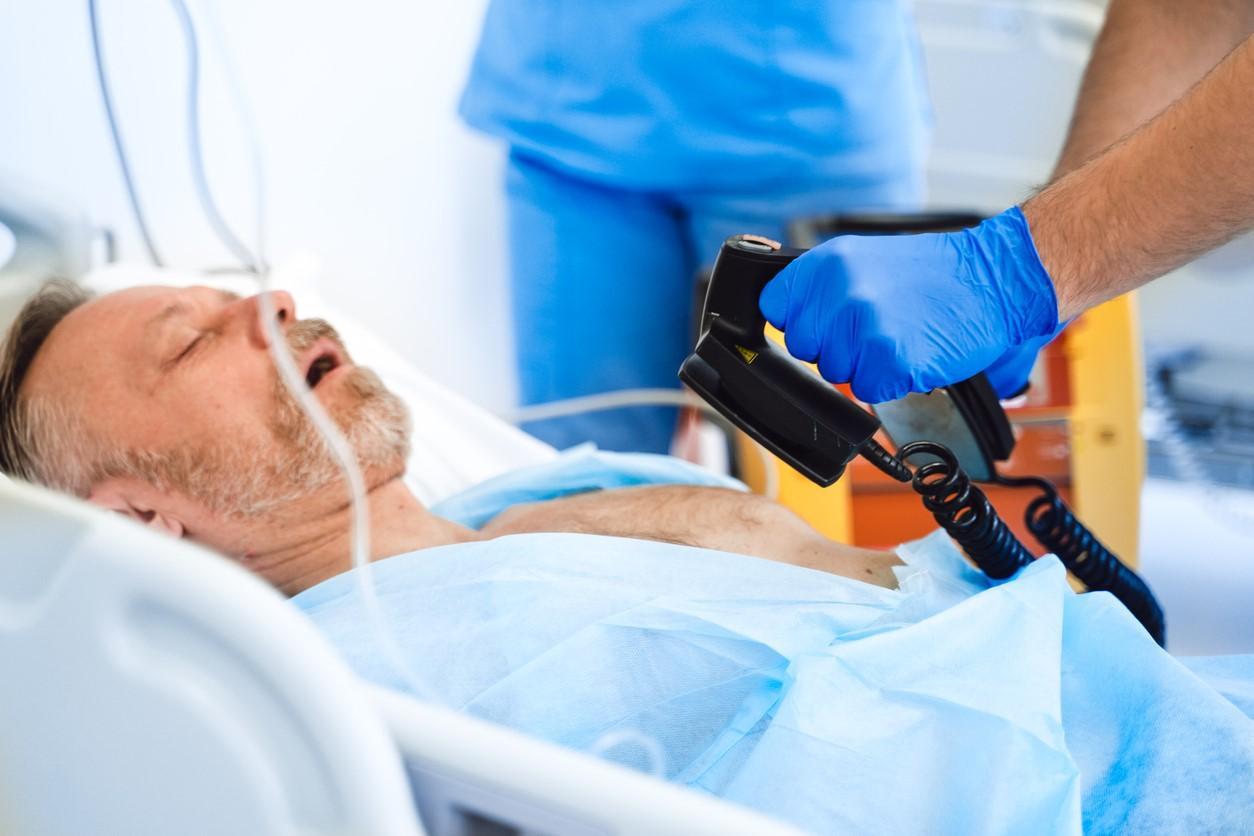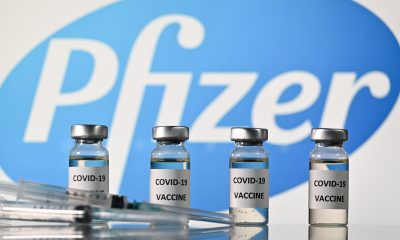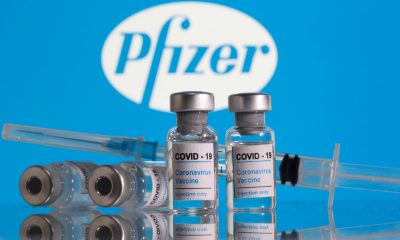Covid-19
COVID vaccine may cause long-term heart damage, study reveals
Published
2 years agoon

Japanese researchers said they found evidence of long-term heart damage in people who received COVID-19 vaccines — including in asymptomatic patients — even though vaccine-induced myocarditis was thought to be rare, transient and limited to subjects experiencing heart symptoms.
Researchers led by Takehiro Nakahara at Keio University School of Medicine used a retrospective study design to compare positron emission tomography/computed tomography (PET/CT) scans between patients undergoing imaging before COVID-19 vaccines were available (from Nov. 1, 2020, to Feb. 16, 2021) to scans on other subjects after the vaccine rollout (Feb. 17, 2021, to March 31, 2022).
The 1,003 subjects — 700 vaccinated against SARS-CoV-2 and 303 unvaccinated — were grouped by age (younger than 40, 41-60 years, and older than 60), sex and time between vaccination and PET/CT.
Of the vaccinated subjects, 78% received the Pfizer-BioNTech BNT162b2 product while 21% got the Moderna mRNA shot. No difference in FDG uptake was observed in patients taking either product.
READ ALSO: How Pfizer, Moderna control COVID-19 vaccine narratives, influence health policy
Subjects who received AstraZeneca’s shot, or one of the other less common vaccines, were excluded because their low numbers would have introduced uncertainty to the analysis.
To capture safety signals from asymptomatic subjects only, investigators chose subjects who were scanned for issues unrelated to the heart. Most scans were for cancer diagnoses.
Higher FDG uptake was also observed in tissues outside the heart, including the liver, spleen, and the whole body, and particularly in axial (armpit) lymph nodes. Earlier studies claimed these effects disappear after 2-3 weeks, but Nakahara showed they last for up to six months.
Twenty-five subjects had more than one scan during one or both study periods, and 16 underwent a PET/CT test in both the pre- and post-vaccine time periods. Within this small subgroup, vaccinated subjects showed significantly higher FDG uptake in both the heart and axial lymph nodes.
Although myocarditis persisted longer than 120 days, its occurrence was not statistically significant beyond that time point.
Myocarditis occurs in the general population at rates of 6.1 and 4.4 per 100,000 for men and women, respectively. Symptoms include chest pain, shortness of breath and heart palpitations.
READ ALSO: Doctors, activists, others intensify calls to stop COVID-19 vaccine shots
According to the Centers for Disease Control and Prevention (CDC), “Most patients with myocarditis or pericarditis after COVID-19 vaccination responded well to medicine and rest and felt better quickly.”
Treatment for myocarditis involves rest, pain relievers, anti-inflammatory medications and in some cases, hospitalization.
First, since this was a retrospective study from a single hospital with limited ability to control for a subject’s health status and metabolism, its power to predict myocarditis was limited. This led the study authors to conclude: “A prospective study would be needed to validate the findings of this study, including comparisons with cardiac enzyme levels, cardiac function, and non-mRNA vaccination.”
Second, since scan results came from historical records, investigators were unable to prepare subjects appropriately for an FDG heart study. FDG accumulates and is metabolized similarly to table sugar, so subjects undergoing FDG imaging usually undergo a fast or specialized diet leading up to the test. Nakahara could not control the pre-scan prep.
Bluemke described Nakahara’s subject inclusion criteria as providing a “convenience sample” — one that was tailor-made for a desired result. He argued that the higher cardiac uptake of FDG might be normal for cancer patients and not a result of vaccination.
But his main criticism focused on the limitations of FDG heart scans. “Unfortunately, in routine clinical practice, 18F FDG PET/CT is a terrible tracer with which to evaluate myocardial inflammation … because glucose is the normal source of energy for the myocardium [heart],” Bluemke wrote. “Routine PET/CT cannot help to reliably identify higher activity due to inflammation on an already high background of normal myocardium.”
READ ALSO: Over 80 lawsuits in UK allege AstraZeneca COVID vaccine severe Injuries
McCullough explained that the human heart requires free fatty acids as its fuel source. Heart muscle cells that change to preferring glucose signal metabolic dysfunction or disease.
“What Nakahara reported was that for nearly every person who took a COVID-19 vaccine, the heart began to prefer glucose over free fatty acids,” McCullough said. And FDG lit their hearts up “like a Christmas tree. But people who didn’t take the vaccine had normal PET scans. Nakahara had patients out for six months after the shots and the changes were [still] there.”
When asked if the damage was permanent, McCullough said, “We don’t know. We don’t know the implications — they’re so broadly reaching — but what I can tell you today, it looks like almost no one who took a shot right now has a normal heart by positive emission tomography scan.”
McCullough cited a study that found heart damage nine months post-vax, and other work suggesting that the risk of permanent heart damage was about 2.5% per shot, meaning someone who took two shots plus a booster may have a nearly 8% increased risk for persistent myocarditis compared with unvaccinated individuals.
He wrote that by December 2021, VAERS “contained 1626 reported cases of myocarditis that occurred within 7 days of vaccination,” which translated to a myocarditis rate of between 7 and 11 cases for every 100,000 mRNA vaccine doses administered.
As late as Sept. 12, 2023, the CDC reported that anaphylaxis rates following COVID-19 vaccination occurred in just 5 of 1 million administered doses — a rate 50 times lower than the number Bluemeke cited in his editorial.
According to the latest VAERS data, 26,366 cases of myocarditis/pericarditis were reported following COVID-19 vaccination between Dec. 14, 2020, and Oct. 27, 2023. There were also 5,385 reports of myocardial infarction.
You may like


Pfizer apologises for violating regulatory codes, illegally promoting COVID-19 vaccine


British legislator demands Bill Gates, other ‘COVID Cabal’ faces death penalty


Researchers identify ‘improbably high rate of deaths’ in newborns who received new RSV shot


Adjuvants in COVID vaccines may lead to serious respiratory disease –experts


Surgeon General calls for halt in use of COVID mRNA Vaccines


How Pfizer, Moderna control COVID-19 vaccine narratives, influence health policy
Trending

 Entertainment1 week ago
Entertainment1 week agoSinger Simi faces backlash after TikToker admits to false rape allegation

 Entertainment5 days ago
Entertainment5 days agoSimi addresses resurfaced 2012 tweets amid online backlash

 Comments and Issues1 week ago
Comments and Issues1 week agoNigeria’s Declining Oil Output and Soaring Foreign Portfolio Investment Inflow

 Comments and Issues1 week ago
Comments and Issues1 week agoEx-prince Andrew’s arrest, lessons for Nigeria

 Health7 days ago
Health7 days agoSCFN, LUTH introduce bone marrow transplants as curative treatment for sickle cell

 Business1 week ago
Business1 week agoPENGASSAN warns Tinubu’s executive order on oil revenues could jeopardise 4,000 jobs

 Comments and Issues1 week ago
Comments and Issues1 week agoThe Seyi Tinubu’s jellof rice, loaves of bread

 Health3 days ago
Health3 days agoDeclassified CIA memo explored concealing mind-control drugs in vaccines

